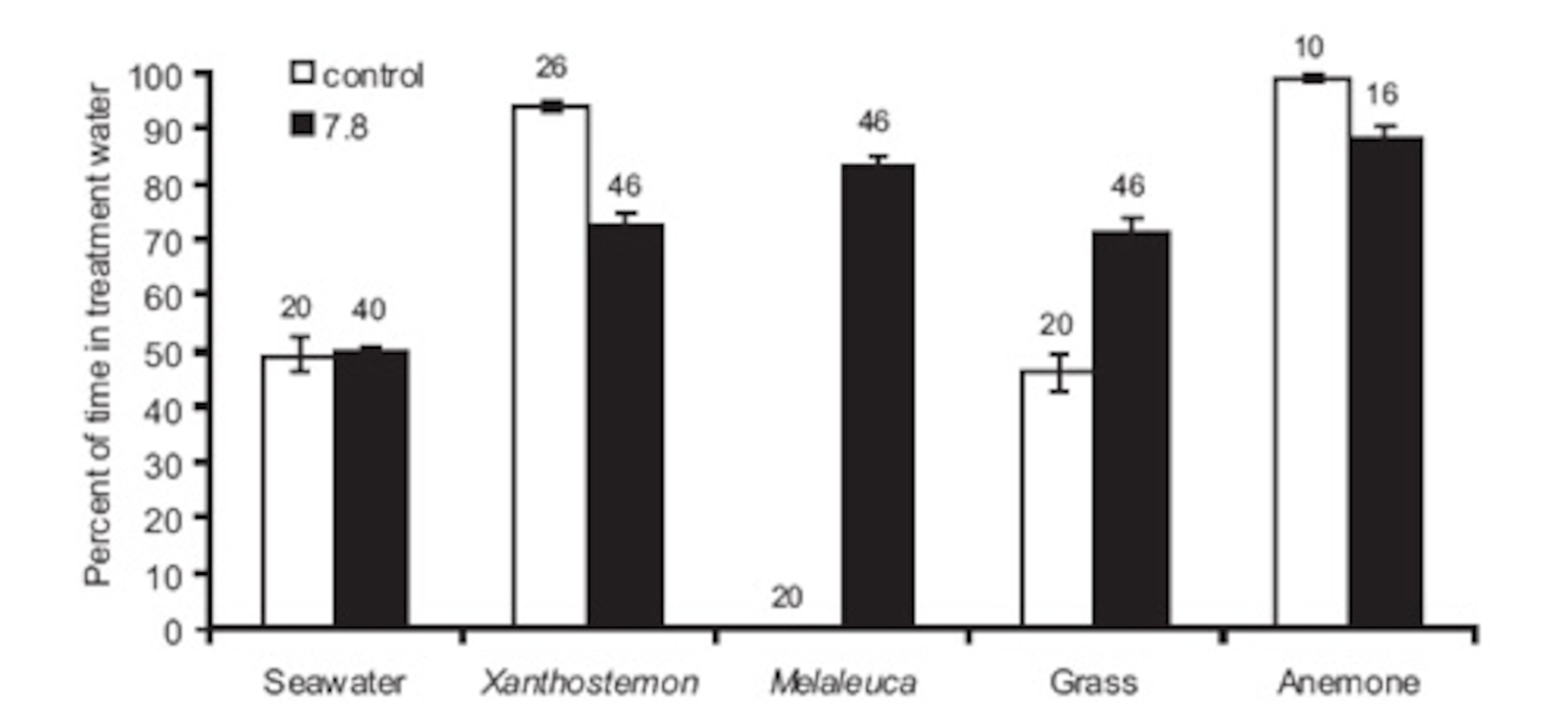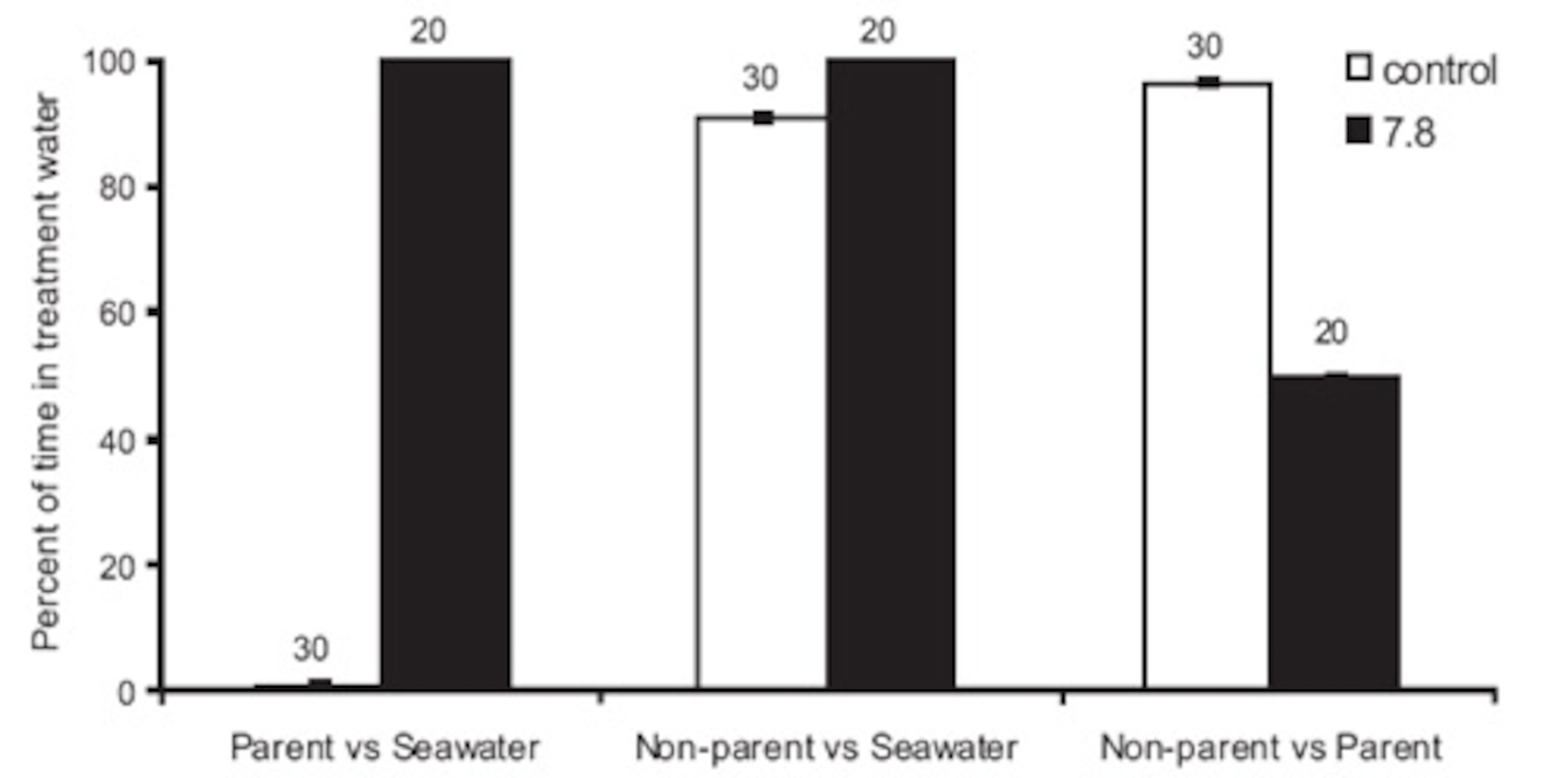Losing Nemo – acid oceans prevent baby clownfish from finding home
In the movie Finding Nemo, the eponymous clownfish grows up in the security of his home reef and must find his way back after being fry-napped by an overenthusiastic diver. In reality, the larvae of clownfish spend their early lives adrift in the open ocean and only after weeks, or possibly months, do they return to the reefs where they were born.

Their journey is guided by several cues that help them navigate home. The sound of a reef may be one of these but it’s clear that the most important sense for a returning fish is smell. Young fish have very well developed smell organs and respond appropriately to the molecules given off by other fish, and by the sea anemones that they live in. They have a keen nose for things that smell fishy, and there is even some evidence that they can use smell to distinguish the water of their birth reef from that of any other.
But this uncanny homing ability isn’t foolproof. Philip Munday from James Cook University in Australia found that increasing the amount of carbon dioxide in the water muddles the senses of baby clownfish, sending them towards smells they would normally avoid. For an animal that relies so heavily on smell to find a suitable place to live, that could be catastrophic.
Sadly, the conditions in Munday’s experiment have a very good chance of coming to pass. As humans pump ever more carbon dioxide into the atmosphere, at least a third dissolves into the oceans, making them increasingly acidic. Over the past 200 years, the pH of the oceans has fallen 100 times faster than any time in the last 650,000 years. Marine life will suffer as a result – corals will find it harder to build their mighty reefs in water depleted of the ions they need. Shellfish that build limestone skeletons will also face trouble. Now, it seems that the popular clownfish joins the list of species at risk.
Orange clownfish are fussy about where they settle and use their discerning noses to find reefs that surround vegetated islands. They are drawn to the smell of island reefs as opposed to open-water ones, and the distinct whiff of rainforest trees.
Munday raised young clownfish in his lab and when it became time for them to settle, he placed them in a Y-shaped tank. They could choose to swim down one of two channels – one loaded with a specific smell and the other with untainted seawater. This choice-task showed that the larva inevitably headed for a channel that wafted the smell of sea anemones or a tropical rainforest tree (Xanthostemon). If one channel was loaded with the smell of grass, or if both just ontained seawater, the fish showed no preferences. And they actively avoided channels that smelled of a swamp tree called Melaleuca, whose leaves contain pungent oils.
All of that changed when Munday raised and tested the fish in water containing extra carbon dioxide. He added enough gas to lower the pH of the water from 8.15, which is what seawater currently is, to 7.8, which is what it probably will be y 2100, if current emissions go unabated.
In this slightly more acidic water, the clownfish were still drawn to the smells of anemones and rainforest trees, but to a weaker degree. And this time, they were also attracted to the smells of the grass, and even the strongly smelling swamp tree that they so thoroughly avoided earlier. In normal water, they totally avoided Melaleuca-infused water, but at a pH of 7.8, they spent more than 80% of their time in it.

The acidic water even affected their attitudes to the smells of their parents. By right, clownfish should stay clear of the parts of their birth reefs where their parents live, not to avoid going round for dinner, but so that they can avoid inbreeding. Under normal conditions, this is true – larvae avoid water that their parents had previously swum in. But add carbon dioxide and once again, they’re thrown. This small change strips them of the ability to smell the difference between their own parents and other clownfish. Given the choice, they will spend equal amounts of time in water infused with either smell.

When Munday made the water even more acidic, with a pH value of 7.6, the situation was even worse. In these conditions, the clownfish larvae didn’t respond to any smells at all! Whether anemone, swamp tree, parent or peer, the fish showed no preference for any of their odours. Even if the larvae were raised in acidic water and tested in normal conditions, they noses still failed them.
These indecisive fish were not retarded in any way. They were just as big and active as larvae raised in normal water and were just as keen to settle down (they would hug the wall of the tank in the same way). Using an electron microscope, Munday showed that their smell organs were well developed too. All the right tools were available; the fish just couldn’t use them.
Munday suspects that either the low pH or the high carbon dioxide levels were disrupting the transfer of chemical signals within the fish’s sense organs. It’s hard to say which of these factors was more important, since they are obviously linked.
Either way, it’s clearly bad news – it’s not unreasonable to think that the ocean’s pH levels will actually drop to the levels that Munday simulated. That could so confound a clownfish’s sense of smell that it might end up in an poor habitat, or one with no places to settle at all. And without an influx of young blood, adult populations would soon decline. Even marine parks and protected areas would do little good for conservations then.
The big question then becomes whether the clownfish can adapt to these changes. Munday is sceptical – he points out the ocean’s pH values have been relatively stable for 650,000 years, so many marine species may completely lack the genetic variation needed to cope with substantially lower values. And with the oceans acidifying at such a rapid pace, only reef fishes with the very shortest generation times would have a chance of adapting to keep pace. The clownfish, and other reef fishes, provide yet more living reasons to be serious in our response to climate change.
Reference: P. L. Munday, D. L. Dixson, J. M. Donelson, G. P. Jones, M. S. Pratchett, G. V. Devitsina, K. B. Doving (2009). Ocean acidification impairs olfactory discrimination and homing ability of a marine fish Proceedings of the National Academy of Sciences DOI: 10.1073/pnas.0809996106
More on acidic oceans:

